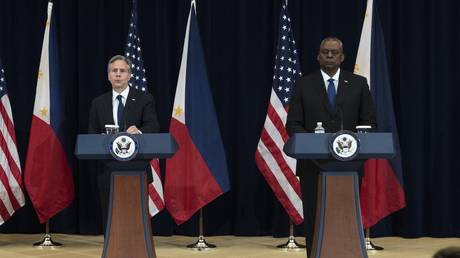
Lloyd Austin could not explain military and intelligence officials’ delay in spotting the unauthorized disclosures
US Defense Secretary Lloyd Austin has said he was not made aware of a major leak of classified intelligence documents until more than a month after they first appeared online, raising questions about the government’s response as the Pentagon and Justice Department scramble to determine the origin of the breach.
Speaking at a Tuesday press briefing alongside Secretary of State Antony Blinken and a senior official from the Philippines, Austin took an aside to address the document leak, which has dominated headlines since they were noticed by US media last week.
Stating the government takes the disclosures “very seriously” and had ordered an “urgent cross-department” probe, the Pentagon head also revealed that he was first briefed on the leaks on the morning of April 6 – weeks after the sensitive files first appeared online.
Asked by a reporter how the documents could have been freely accessible online for “at least many weeks… before US intelligence knew they were in the public domain,” Austin was unable to provide a clear answer, instead reiterating that officials would conduct a thorough investigation.
“Well, they were somewhere in the web, and where exactly and who had access at that point we don’t know. We simply don’t know at this point,” he said. “I will tell you that we take this very seriously and we will continue to investigate and turn over every rock until we find the source of this and the extent of it.”
A similar query addressed to Secretary Blinken was also met with a Glomar response, with the senior diplomat stating “I’m certainly not going to comment on these purported documents.”
The batch of sensitive documents appeared online in early March on the chat platform Discord, but the first media reports on the leaks did not emerge until last week. The document trove is made up of dozens of classified pages containing information about US and NATO war planning in Ukraine, including timelines for training and arms deliveries, data on ammunition expenditures, the structure of Ukrainian combat units, estimated Russian and Ukrainian losses, and information regarding foreign special forces on the ground. Other material related to US counter-terrorism efforts, as well as its policies in the Middle East and China, is also reportedly included in the files. However, so far officials have declined to confirm the accuracy of their contents, saying only that they are looking into the leak and working to remove the documents from the internet.




